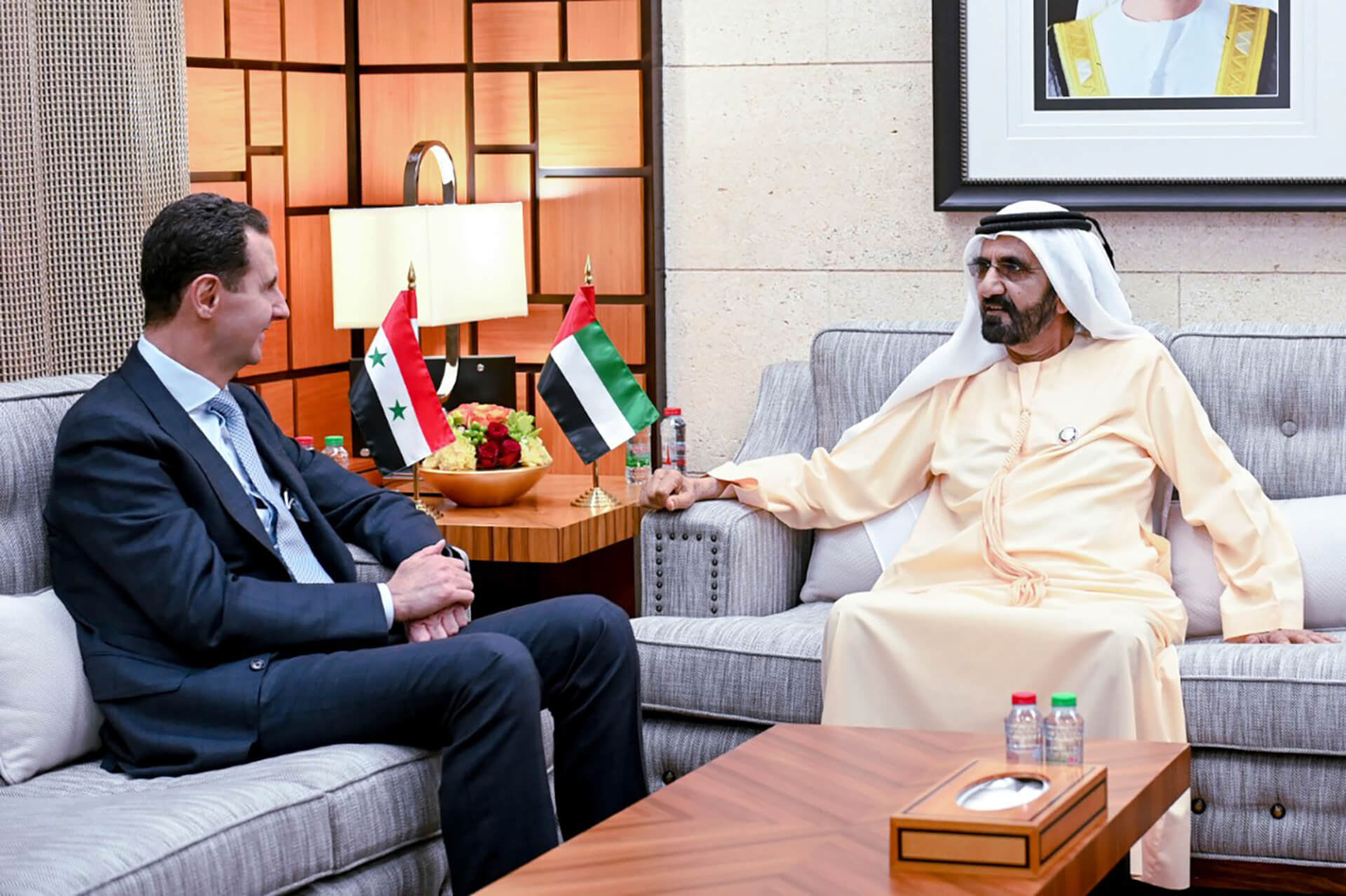As part of his continued efforts to mend ties with the Arab world, Syrian President Bashar al-Assad visited the United Arab Emirates (UAE) on Friday, his first visit to the Gulf country since the eruption of the Syrian civil war back in 2011.
During the one-day visit, Assad met with Crown Prince of Abu Dhabi Sheikh Mohammed bin Zayed (MBZ) to discuss the situation in Syria and efforts to bring peace to the country. MBZ stressed that the UAE is keen to “strengthen cooperation” with Syria as Damascus is a “fundamental pillar of Arab security.”
الرئيس الأسد يلتقي صاحب السمو الشيخ محمد بن زايد آل نهيان ولي عهد أبو ظبي نائب القائد الأعلى للقوات المسلحة. pic.twitter.com/qeebWQU1ii
— Syrian Presidency (@Presidency_Sy) March 18, 2022
According to the UAE’s state-run WAM news agency, both leaders emphasised on the importance of “preserving the territorial integrity of Syria and the withdrawal of foreign forces from the country,” referring to the presence of Russian, American, Turkish, and Iranian soldiers in Syria. MBZ said that the UAE will help Syria with “political and humanitarian support” and continue to support efforts to reach a peaceful solution to the war.
Assad praised Abu Dhabi for its “balanced policies” on international issues and said that the Gulf country plays a major role in the Middle East. As a result, he called on both countries to strengthen relations in order to protect “the sovereignty of our countries, and the interests of our peoples.” Moreover, both leaders agreed to jointly coordinate to ensure the region’s “security and stability.”
Assad also met with Dubai’s ruler Sheikh Mohammed bin Rashid Al Maktoum at his palace in Dubai, where they discussed the Syrian civil war as well as regional and international issues of concern, and economic relations.
Video: HH Sheikh Mohammed bin Rashid receives President of #Syria, Bashar Al Assad in the UAE. pic.twitter.com/d6Hcbvc0JS
— حسن سجواني 🇦🇪 Hassan Sajwani (@HSajwanization) March 18, 2022
Assad’s visit to the UAE is a clear indication that the Gulf country is willing to re-engage with the Syrian regime, which it once shunned. In November, the UAE’s Foreign Minister Sheikh Abdullah bin Zayed Al Nahyan visited Damascus and met with Assad to seek greater involvement for Abu Dhabi in mediating an end to the Syrian crisis.
Not long ago, Abu Dhabi had allied with the United States (US) in supporting the Syrian rebels that sought to overthrow Assad. The UAE has provided armed assistance to the Free Syrian Army rebels and even criticised the Assad government’s policies. In 2014, the Emir of Dubai, Sheikh Mohammed bin Rashid Al Maktoum, said that Assad was killing his own people and predicted the demise of the Syrian regime.
Worst of both worlds for Syrians bombed and killed by Assad. The UAE is one of those countries that helped prolong the Syrian war by funding and arming some of the most vicious and extreme rebel groups - only to end up hosting and normalizing Assad after all these years. Sigh. https://t.co/T42bhHifcB
— Mehdi Hasan (@mehdirhasan) March 19, 2022
In this respect, Washington condemned Abu Dhabi’s decision to host Assad. State Department spokesperson Ned Price said on Friday that the US was “profoundly disappointed” with the UAE for welcoming Assad and accused Abu Dhabi of normalising ties with a regime that has committed “horrific atrocities.” Price said that the US “does not support efforts to rehabilitate Assad, and we do not support others normalising relations.”
The Ukraine war reminds us that the Middle East is multipolar
— Samuel Ramani (@SamRamani2) March 20, 2022
Turkey and Israel's refusal to sanction Russia, the UAE's open-arms meetings with Assad and Lavrov, and Saudi Arabia's hosting of Russian arms manufacturers are symbols of an entrenched geopolitical reality
However, the US’ opposition to normalising ties with the Assad regime has not stopped its Arab allies from slowly warming up to Syria, especially as the regime has recaptured a lot of the area it initially lost to the rebels. In October, Jordanian King Abdullah II met with Assad to discuss ways to enhance cooperation and re-establish ties. Egypt and Lebanon have also been making efforts to strengthen ties with Assad’s regime.
Syrian President Assad’s isolation in the #MiddleEast is over. After more than 10 years, he is back on the regional arena for his first official meeting with an Arab country #UAE. Assad, Lukashenko and Tokayev owe their power to Putin & Russia’s military involvement. #geopolitics pic.twitter.com/O2dyXabJfd
— Velina Tchakarova (@vtchakarova) March 19, 2022
The US’ hasty withdrawal from Afghanistan and President Joe Biden’s announcement that America will concentrate more on its rivalry with China has only further increased anxieties among Washington’s Arab allies. Moreover, the lack of US support for the Gulf coalition in Yemen and its preference for a nuclear deal with Iran despite the opposition of several Arab states has led countries like the UAE and Saudi Arabia to seek closer ties with Syria, Russia, and China.
The brutal conflict in Syria has killed close to 400,000 people, forced more than five million to flee as refugees, and displaced another six million within the nation’s borders. The United Nations (UN) estimates suggest that more than 13 million people require humanitarian assistance in Syria, along with 90% of all children in the country. Although Assad has managed to reconsolidate power since the war began in 2011, prospects for lasting peace in the country remain dim, with no progress on peace talks or UN-led efforts to draft a new constitution.

